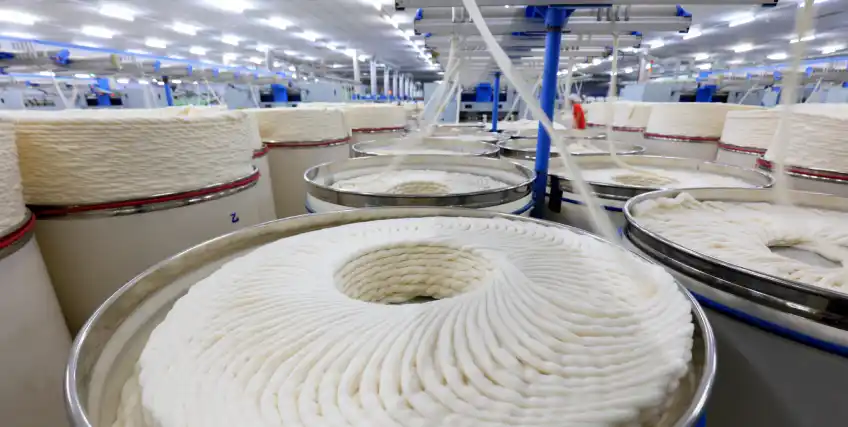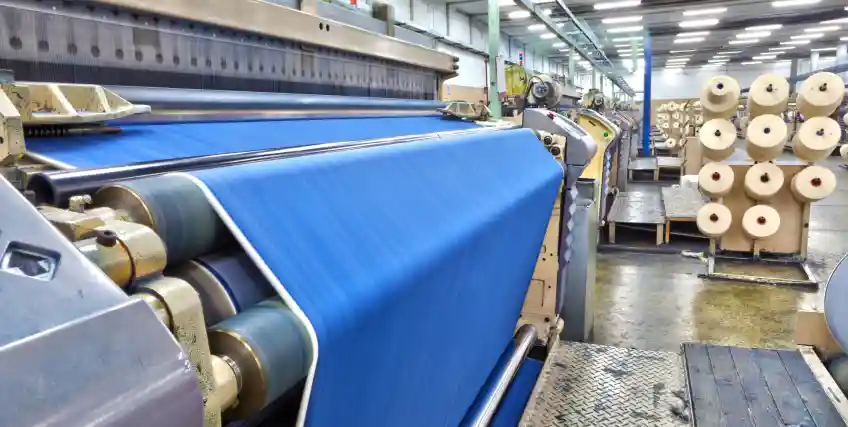How to Secure Funding for Your Apparel Manufacturing Business
Sep 02, 2025 | Last Updated on: Sep 03, 2025

To start an apparel manufacturing business in the U.S. today demands creativity and craftmanship. Behind every great fashion label lies a supply chain powered by skilled workers, heavy-duty equipment, and raw materials. And, all of these cost money, often more than expected.
Many apparel business owners often struggle to maintain consistent cash flow in their business. Hence, this makes securing funding for your apparel business a smart move at the right time. However, with so many apparel financing options available, it can feel a bit overwhelming. But the good news is that, you don’t have to figure it out alone.
In this guide, we’ll explore some of the common ways to secure funding for your apparel manufacturing business. Additionally, we’ll also discuss different loan options, how to qualify, and when to take action.
What Is an Apparel Manufacturing Business?
Apparel manufacturing businesses specialize in large-scale production of garments such as t-shirts, uniforms, hoodies, and sportswear. From sourcing high-quality raw materials to executing complex cut and sew operations, these manufacturing businesses manage every phase of the production process.
Additionally, these businesses form the backbone of the U.S. fashion and retail industry, serving various ecommerce platforms, national retailers, and emerging fashion brands.
These apparel manufacturing businesses are responsible for:
- Sourcing raw materials like fabric, buttons, and zippers.
- Operating machines to cut, sew, and finish garments.
- Managing teams, deadlines, and quality standards.
There are many U.S.-based businesses who also work for domestic brands, government agencies, or ecommerce sellers who require fast and high-quality production of garments. Additionally, the U.S. apparel industry thrives on variety and innovation from sportswear, hoodies to custom clothing and screen printing.
Understanding the Financial Needs of Apparel Manufacturing Businesses
Apparel manufacturing businesses require more than just cutting and sewing machines. They also demand skilled labor, strong supply chains, and reliable logistics. Therefore, each stage of the manufacturing process, from sourcing fabrics to quality control needs working capital.
Here’s how textile machine financing can help manufacturing businesses:
- Inventory Costs: Business loans can be used to buy raw materials in bulk to meet mass production goals.
- Labor: Various textile industry loans can be used to hire seamstresses, designers, packers, and production managers.
- Equipment: Manufacturing businesses can use funds to maintain or upgrade textile machines and software for pattern making and automation.
- Cash Flow Gaps: To handle payroll or utility bills during slow client payments, business financing can provide the necessary funds.
- Seasonal Demand: Small business loans can be used for scaling production during trade shows or high-demand seasons.
Let’s take an example, if a small clothing brand places a private label order for t-shirts with custom embroidery and low MOQ (minimum order quantity), the manufacturing business must manage lead times, fabric sourcing, and product development costs.
Popular Funding Options for Apparel Manufacturing Businesses
The right funding option can help your apparel manufacturing business grow, stay consistent, and avoid cash crunches in the near future. Here are some of the most popular funding options that you can consider for your apparel business in the U.S.
Term Loans
Term loans are traditional business loans offered by banks and various online lenders. These loans offer a lump sum loan amount that can be repaid over a set period of time. Also, these business loans come with fixed interest rates and a fixed repayment schedule.
Apparel manufacturing businesses can use term loans to buy equipment, hire staff, or expand production space. Additionally, garment manufacturing companies can use these loans to automate part of their cut and sew operations for faster production and better quality control.
Business Lines of Credit
A business line of credit is a flexible funding option that offers quick access to funds up to a set credit limit. Borrowers can draw funds when needed and pay interest only on the amount used.
Apparel manufacturing businesses can use a line of credit for covering short-term working capital needs, managing cash flow, sourcing materials, or meeting unexpected production costs. Hence, this funding solution is best for startups who are looking to manage their first clothing line launch.
Equipment Financing
Equipment financing is a business funding solution designed specifically to purchase business-related assets like tools and machinery. Instead of paying the upfront cost for the equipment, this financing option lets small business owners pay in easy monthly payments. Here, the equipment itself serves as collateral, reducing the risk for the lenders.
Apparel manufacturing businesses can use equipment financing to purchase high-end textile machines or screen-printing equipment. Additionally, business owners can buy sewing machines, fabric printers, or CAD systems used in in-house production through equipment financing.
SBA Loans
SBA loans are backed by the U.S. Small Business Administration and offer loan amount to support small businesses in the United States. These loans often come with lower interest rates and longer repayment terms for qualified applicants.
Apparel manufacturing businesses can use SBA loans to fund eco-friendly initiatives and factory upgrades. Moreover, entrepreneurs with a detailed business plan and a growing clothing manufacturing business can qualify for these business loans.
Invoice Financing
Invoice financing is a funding solution where businesses borrow money against the amounts due from customers or unpaid invoices. This financing option helps bridge cash flow gaps when clients take longer to pay.
Apparel manufacturing businesses can use invoice financing for B2B contracts, private label orders, or bulk deliveries with extended lead times. If retailers or wholesalers delay payments, invoice financing provides quick access to capital by using unpaid invoices as collateral. Therefore, this funding option is great for small businesses that rely on partnerships with larger retailers.
Merchant Cash Advance (MCA)
A merchant cash advance is a financing option where a business receives a lump sum in exchange for a percentage of future sales. This is not a loan, but rather an advance based on your projected revenue. With an MCA, you receive a lump sum and repay it using a percentage of daily sales.
Apparel production businesses can use MCA for fast approvals and for production emergencies. However, before considering this option make sure to compare costs and understand how it affects your cash flow.
How to Qualify for Apparel Manufacturing Business Funding
Before offering business loans for your apparel manufacturing business, lenders want to see that your business is reliable and can repay the loan. Hence, here’s what helps improve your business loan approval chances:
- Credit Score: Make sure to have a strong personal and business credit history as it builds trust.
- Consistent Revenue: Gather financial statements, monthly income reports, and profit statements to show stability.
- Detailed Business Plan: Draft a detailed business plan by outlining your goals, production process, sourcing strategy, and sales forecast.
- Time in Business: Lenders often prefer companies with at least 1–2 years of operations.
Note: Don’t forget to include details like tech pack development, MOQ commitments, and important business plans to streamline or optimize production.
When Is the Right Time to Consider Apparel Manufacturing Business Funding?
Getting the necessary business funding isn’t just for emergencies. Small business owners in the manufacturing industry need to plan ahead to secure the right business financing option.
Here are signs to pay attention to the right time when considering apparel manufacturing business funding:
- Order Surge: Your factory receives large orders for sportswear or custom t-shirts from a growing e-commerce brand.
- Payment Gaps: Retailers take 60+ days to pay, hurting cash flow.
- Expansion Plans: You’re launching a new fashion line or adding automation to optimize the supply chain.
- Sustainability Goals: You want to upgrade to eco-friendly fabric sourcing or reduce production waste.
- Trade Show Prep: Participating in fashion industry trade shows and need capital for samples or booth space.
The Bottom Line
Securing funding for an apparel manufacturing business isn’t just about surviving slow seasons. It’s about powering a sustainable, optimized, and profitable production process.
Whether you’re sourcing fabric, building a prototype, or expanding your fashion brand, the right financing makes all the difference. Hence, now is the time to streamline operations, invest in automation, and take your apparel manufacturing business to the next level.
So, get started today and explore funding options to grow your clothing production in a smart way.
FAQs About Apparel Manufacturing Businesses
What are the most suitable funding options for apparel manufacturing businesses?
That depends on your business’s structure, cash flow needs, and goals. Some manufacturers may benefit from term loans to expand production, while others might lean on invoice financing during slow payment cycles. Additionally, flexible credit lines can help with raw material purchases, and startups sometimes turn to merchant cash advances for quick funding.
How important is my credit score when applying for funding?
Credit score plays an important role, especially for bank and SBA loans. However, it’s not the only thing lenders look at. Consistent revenue, low debt, cash reserves, and even your customer base can carry weight. Also, some financing options may still be available even with average credit if other parts of your business are solid.
When is the right time to apply for funding?
Many business owners look into funding during growth moments, like taking on a big order, expanding production, or launching a new clothing line. However, it’s often better to apply before cash gets tight. Hence, planning ahead can open up more choices and give you time to evaluate what truly fits your operation.
What financial documents do I need to prepare before applying?
Most lenders will want to see a business plan, tax filings, profit-and-loss statements, bank activity, and possibly production forecasts. If you’ve signed contracts with retailers or run private label programs, including that info can support your application. Moreover, keeping organized financial records makes the process smoother.
What can I do if I get denied for funding?
Start by finding out why. Sometimes the issue is credit, missing paperwork, or revenue volatility. From there, you can explore alternate paths like smaller funding amounts, adjusting your application, or building up financials for a stronger reapplication. There are also non-traditional options, such as online lenders, peer networks, and partnership-based funding.
Frequent searches leading to this page
Term Loans are made by Itria Ventures LLC or Cross River Bank, Member FDIC. This is not a deposit product. California residents: Itria Ventures LLC is licensed by the Department of Financial Protection and Innovation. Loans are made or arranged pursuant to California Financing Law License # 60DBO-35839




